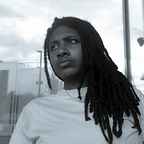on walking and choosing your weapon (hiatus kaiyote, 2015).
Walking reminds me of both my weight and my weightlessness. It initially tends to feel like lugging pure reluctance across sludge, but is then followed by euphoria, equally defiant in its insistence that my feet aren’t entirely mine. The mind becomes the sun in its centrality and presumptuousness. And in the realm of chaotic cadence, of calves and callouses, of more curves than corners, and of approximately 69 minutes, Hiatus Kaiyote is instructing me to choose my weapon.
I’d say that weapon suggests a battle of any scale: maybe song to serve as backdrop for squabble, or I could engage with song itself while contemplating upon the intricacies of sparring; orchestrate war to the tune of, or be defeated by the wallop of words. I could softly surrender to their strength, hold my breath during the silent sermon — beat and beat drop — or swallow the anticipation and demolish any suggestion of rhythmic structure.
Be not intimidated by distortion. Do not discredit muscle memory‘s ability to recite home verbatim.
My first passage through Choose Your Weapon involved a Friday evening. I was adamant about ignoring Google Maps’ shortest route suggestion because apparently time could be possessed and I had vats of it. I took a line of the metro I had never before taken in the name of doing-things-purely-for-the-experience — an integral part of my personality at the time. I was uncomfortable breathing among so many unknown parts.
I maintain the mindset that self-discovery could be and should be boldly self-indulgent. Regardless of how crowded anywhere is, once there is movement, there is always space in between. My gaze tends to gravitate toward these gaps. The fleeting oxygen makes magnets of my lungs. As a fervent believer in the possibility of enlightenment despite an absence of light, it seems I am no stranger to isolation.
Perhaps similarly, CYW’s title track has words that peer behind instrumentation to imply that co-existence is not inherently tension-free. That stress can waver: just short enough of taut to allow for instances of flow. The wind between the blunt impact of shoes against pavement and gait’s saving grace.
And then it’s personal: I decide how I want to consume what’s about to be served. That kind of autonomy allowing me to slip napkin into rounded neck, elongate vertebrae from ass right up to nose, interlock eager fingers upon bare tabletop — raw and mannerly. I will not break until I have licked the plate clean.
Shaolin Monk Motherfunk is honestly one of the most mindblowing album openers I have ever experienced. It isn’t singular in song. I say this not just because of the number of breaks and beat changes and melody shifts, but also because of the refreshment nestled within in each listen. It is abstract enough for interpretation based on any current state of mind and solid enough to break possibility into a million discoverable pieces. It promises conquest: victory comes easy if you set the parameters yourself.
As time fleets, don’t tire; tie your hand in mine.
Shaolin Monk Motherfunk is a touchstone sitting between the rise and fall of my heaving chest.
and Borderline With My Atoms comes with gravity and my feet slap the earth and i suppose i am no longer floating Nai Palm sounding like church and i feel irreverent sonic holy-ghost envelopment i worship it with fingers crossed behind my back.
Borderline with my atoms; borderline, in time, it all collides.
Critics have written off the interludes’ contribution to this album but there are lessons on decisiveness lingering within the separation of one song from another. Cicada bridges more than the tracks: first, I am submerged in a host of loves that render me unable to speak, suffused with mutual understanding, and then I am made aware of a swamp thing showing me another kind of lurking death. I don’t pay attention to the titular distinctions as I listen to the album, so it feels a lot like a moment of consciousness where I can build forthcoming action upon intent: here, I can choose to either blissfully drown in the opened mouth of a consecrated wave or dip my toes into sinful, murky-eyed pools.
lease this here now / sweet peace of mind / awake this light
lease this here now / sweet peace of mind / always in flight
Jekyll is conjuring my crevices to a soft place. I sit with them to get acquainted. They take off. I chase.
By means of The Lung’s impeccable timing, I am brought back to the breath. Isn’t it almost ridiculous that our bodies can stop breathing without informing us, to the point where we have to remind ourselves of the very action affording us the possibility? Perhaps the battle is not in defence of self but against it. Infinite rewards await the exit gates of either option.
I am tempted to suggest that Molasses had to have been recorded in the 90s, but I’ve concluded that that would be a preposterous disregard for that which exists outside of time. Nostalgia is my favourite thing to discuss just because it’s an opportunity to remember that the structures cementing us to any instance of now or then are our own inventions moving with us such that retreating altogether as an option is artfully tucked away. The concept of time is, indeed, a possession with which I can make a mockery of GPS. This penultimate song could be about the sadness that comes with ending, but it chooses not to be. Instead, it’s about the revelation of new avenues. It’s a celebration of the period between a wrong step and its potentially illuminating follow-up.
It could be a compass, rare and so bountiful
It could be the opposing opinion
It could be the point of traction, bound to all
It could be the point of letting it go
